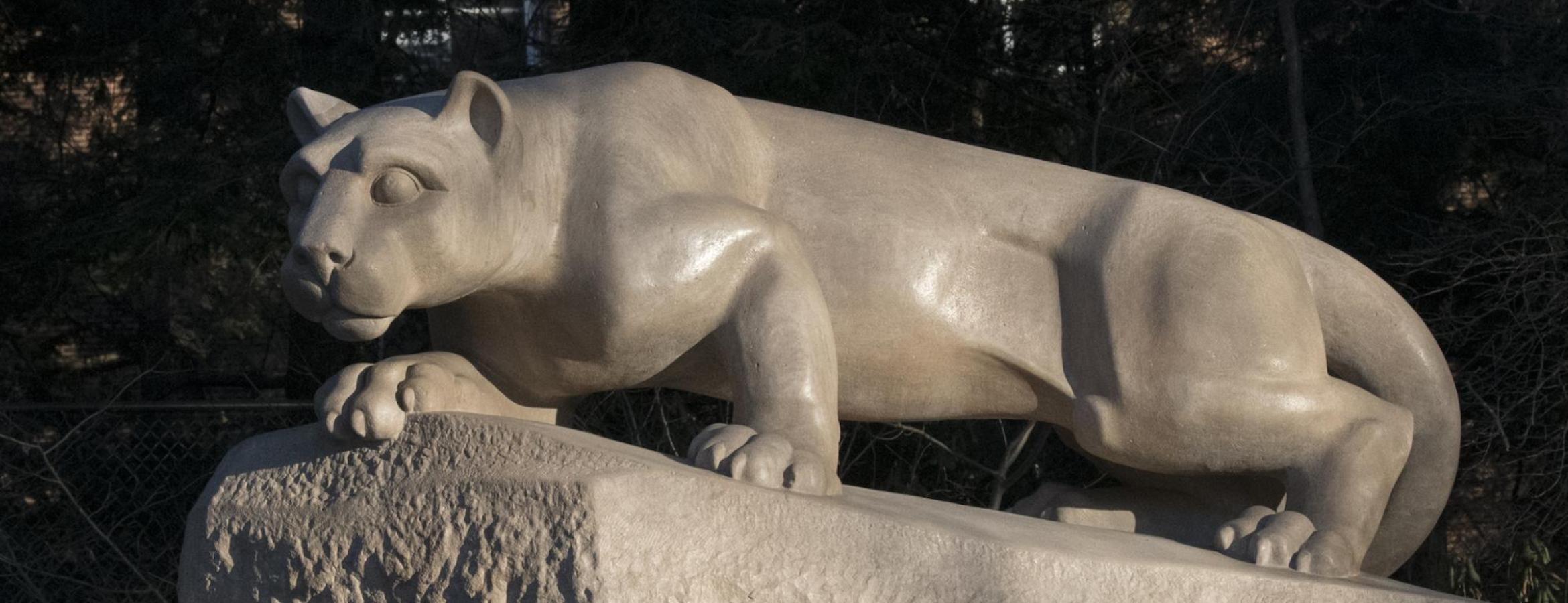The Eberly College of Science welcomes its newest tenure-line faculty members.

Wen Jiang, Dorothy Foehr Huck and J. Lloyd Huck Chair in Structural Biology and professor of biochemistry and molecular biology, investigates the structures of diverse biological systems using cryogenic electron microscopy (cryo-EM). Many of the structures Jiang studies have implications for human health. These include illuminating the atomic structures of viruses to understand host cell infection mechanisms and informing vaccine and antiviral development, characterizing protein complexes implicated in cancer to advance therapeutic strategies, and analyzing protein amyloid aggregates associated with Alzheimer’s disease and related dementias to facilitate diagnosis and treatment of neurodegenerative diseases.
In addition, Jiang develops computer programs to assist in cryo-EM projects ranging from virtual reality training to the classification of helical polymers using deep-learning language models. His research has been published in journals such as the Journal of Molecular Biology, the Journal of Structural Biology, Nature, and the Proceedings of the National Academy of Sciences.
Prior to joining the faculty at Penn State, Jiang was a professor at Purdue University from 2005 to 2024, where he also served as the scientific director and director of their Cryo-EM facility. He was a research associate from 2004 to 2005 and a postdoctoral researcher from 2002 to 2004 at the Baylor College of Medicine where he also earned a doctoral degree in cryo-EM in 2001. He earned a master’s degree in biophysics from the Institute of Biophysics at the Chinese Academy of Sciences in China in 1995 and a bachelor’s degree in physics from Peking University in China in 1992.

Felipe Hernandez, assistant professor of mathematics, is interested in why the large-scale physics of the world is governed by classical mechanics when the laws of nature are written in quantum mechanics. His research uses methods and ideas from mathematical physics, probability theory, and computer science.
Hernandez previously received the Mathematical Sciences Postdoctoral Research Fellowship from the National Science Foundation in 2023 and was a Hertz Fellow from 2017 to 2022. His research has been published in journals such as Communications in Mathematical Physics, Probability and Mathematical Physics, and Journal of Mathematical Physics.
Prior to joining the faculty at Penn State, Hernandez was a National Science Foundation Postdoctoral Fellow in mathematics at the Massachusetts Institute of Technology. He earned a doctoral degree in mathematics at Stanford University in 2023 and a bachelor’s degree in mathematics from the Massachusetts Institute of Technology in 2016.

Carlos Blanco, assistant professor of physics, is a co-hire of the Penn State Institute for Computational and Data Sciences (ICDS). He focuses his research on developing novel techniques for finding physics beyond the standard model of physics, in particular, detecting signatures of dark matter. Through his work, Blanco is doing materials characterization and plans to utilize ICDS computer resources, as well as machine learning techniques like material property prediction, for explorations of properties that would aid in developing detectors for dark matter.
Blanco received a Research Corporation for Science Advancement (RCSA) Fellowship in 2024. His research has been published in journals such as Computational Physics Communications, Physical Review Letters, the Journal of Physics, and the Journal of Cosmology and Astroparticle Physics.
Prior to joining the faculty at Penn State, Blanco was a postdoctoral associate researcher and former NASA Hubble Fellow at Princeton University and a visiting postdoc at the Oskar Klein Centre at Stockholm University in Sweden. He earned master’s and doctoral degrees in physics from the University of Chicago in 2017 and 2020, respectively, and a bachelor’s degree in physics and chemistry from Purdue University in 2015.

Binghai Yan, professor of physics, is a condensed matter physicist that uses computational and physics to predict properties of realistic quantum materials. He specializes in predicting materials that possess required topological properties and exploring their potential applicability in advanced technology. His research aims to comprehend the relationship between topology, chirality and electronic properties through the lens of quantum mechanics and to reveal intriguing quantum effects in the foundation of life.
Yan has been listed as a highly cited researcher by Web of Science from 2019 to 2024. His previous awards and honors include the Morris L. Levinson Prize in Physics by the Weizmann Institute of Science in 2019, the Israel Physics Society (IPS) Prize for Young Scientists from the IPS in 2017, and the ARCHES Prize from the Federal German Ministry for Education and Research and Minerva Foundation in 2017. His research has been published in journals such as Nature, Nature Physics, Nature Materials, and Physical Review Letters.
Prior to joining the faculty at Penn State, Yan was an associate professor at the Weizmann Institute of Science in Israel from 2017 to 2024. He was a group leader at the Max Plank Institute for Chemical Physics of Solids in Germany from 2012 to 2016, a Humboldt postdoc at the University of Bremen in Germany from 2011 to 2012, a postdoc at Stanford University from 2010 to 2011, and a Humboldt postdoc at the University of Bremen in Germany from 2008 to 2010. Yan earned a doctoral degree in physics from Tsinghua University in China in 2008 and a bachelor’s degree in physics from Xi’an Jiaotong University in China in 2003.
